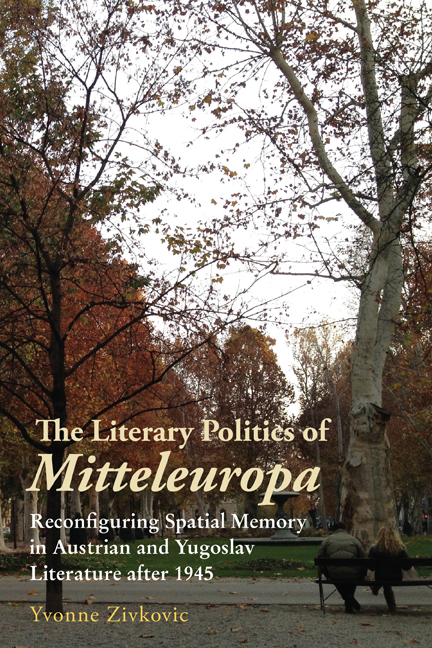 The Literary Politics of Mitteleuropa
The Literary Politics of Mitteleuropa Book contents
- Frontmatter
- Contents
- Acknowledgments
- Abbreviations and Note on Translations
- Introduction: Mitteleuropa as a Transnational Memory Discourse
- 1 The Legacy of Mitteleuropa: Between Geopolitics and Geopoetics
- 2 Ingeborg Bachmann and Peter Handke: The Austrian Mitteleuropa
- 3 Mitteleuropa as Conflicted Community in the Writings of Danilo Kiš and Aleksandar Tišma
- 4 Mitteleuropa after 1989: New Memory Challenges in Christoph Ransmayr and Dubravka Ugrešić
- Conclusion: Mitteleuropa Literature in the Twenty-First Century: Revisiting the Promise of Border-Crossing
- Bibliography
- Index
4 - Mitteleuropa after 1989: New Memory Challenges in Christoph Ransmayr and Dubravka Ugrešić
Published online by Cambridge University Press: 23 March 2021
- Frontmatter
- Contents
- Acknowledgments
- Abbreviations and Note on Translations
- Introduction: Mitteleuropa as a Transnational Memory Discourse
- 1 The Legacy of Mitteleuropa: Between Geopolitics and Geopoetics
- 2 Ingeborg Bachmann and Peter Handke: The Austrian Mitteleuropa
- 3 Mitteleuropa as Conflicted Community in the Writings of Danilo Kiš and Aleksandar Tišma
- 4 Mitteleuropa after 1989: New Memory Challenges in Christoph Ransmayr and Dubravka Ugrešić
- Conclusion: Mitteleuropa Literature in the Twenty-First Century: Revisiting the Promise of Border-Crossing
- Bibliography
- Index
Summary
WHAT HAPPENED TO Mitteleuropa after the historical watershed of 1989? One might assume that with the fall of the Berlin Wall and the disintegration of the Soviet Union, György Konrád's “dream” of Central Europe had come true. With the end of the Cold War, the borders open, and nothing to halt the organic merging of the continent, the separation between Eastern and Western Europe seemed to some like a thing of the past. But when former West German chancellor Willy Brandt famously declared that the reunification of Germany allowed the “growing back together” of parts that intrinsically belonged to each other, he was not referring to the whole of Europe. Since the division of Europe into “east” and “west” had not been invented during the Cold War, but had been in the making since the Enlightenment, it should not come as a surprise that the divided mindset persisted beyond the end of that profound political crisis, not just in Germany. The relief that Western European intellectuals felt at the demise of the Iron Curtain was short lived, and would soon be overtaken by new nationalisms and the horrors of civil war. At the same time that the promise of a Europe without borders suddenly became available to the former Soviet sphere, it fell apart for a group that, despite their unique position in the dissident debate, had been characterized as essentially Central European: the multiethnic, multilingual Yugoslavs.
The outbreak of the secession wars in Yugoslavia in 1991 came as a shock to the West and was depicted as a collective European trauma by various observers, which also led to the unearthing of long standing geographical and cultural notions about the Balkans. Within a few years, Yugoslavia—which many Western intellectuals had considered the last European utopia as the country of the “third way” and of “socialism with a human face”—turned into the savage backwater of Europe in the public imaginary. Writers, journalists, historians, and diplomats were drawing mental maps of a new Orient at the margins of the reunited Occident, a place where the myth of thousand-year-old ethnic hatred was both revived by the warring factions in the former Yugoslavia and confirmed by shell-shocked Western observers.
- Type
- Chapter
- Information
- The Literary Politics of MitteleuropaReconfiguring Spatial Memory in Austrian and Yugoslav Literature after 1945, pp. 223 - 276Publisher: Boydell & BrewerPrint publication year: 2021


